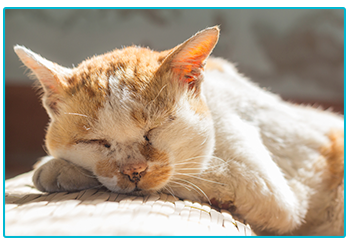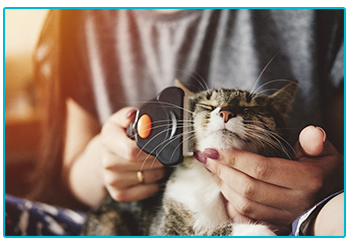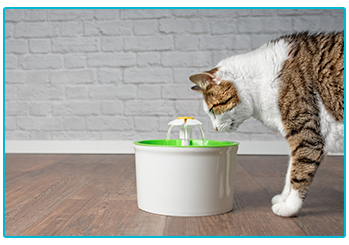Cats make amazing pets, and owning one can be a fantastic adventure! As they age however, our feline friends will need a little more TLC. To find out more about how to care for a geriatric cat, we’ve spoken to our pet health expert. Read on to discover their advice.

Potential problems
Common health issues experienced by senior cats can include:
- Arthritis
- Renal disease
- Hyperthyroidism
- Eye problems
- Heart and dental disease
Veterinary care
As your feline friend gets older, it’s recommended that you take them for regular check-ups with your vet to assess the state of their health. The vet will be able to let you know how often you’ll need to visit, as this will vary from cat to cat. They might also carry out additional routine tests, such as blood pressure checks, urinalysis and blood tests.
Grooming

Senior cats can have limited movement, so they might find it difficult to groom themselves. Brush them regularly, as well as gently wiping down their eyes, nose and bottom if needed. As they’re less active, geriatric cats find it hard to wear down their claws, so they can get them caught on things. Provide them with horizontal scratching posts, and get your vet to clip their nails if they’re too long.
Mobility issues
You might need to rethink the way you feed your senior cat, as they might struggle to eat from a regular bowl if they have decreased mobility. They could also need greater access to their litter tray, as they’re less likely to go outside. Older cats can struggle to walk on hard floors, so consider installing carpet runners. They might also begin to find using a cat flap more problematic.
Food and drink

Older cats still need to drink plenty of water, so make sure they have a good supply. You could have a variety of bowls and even a fountain to help encourage them to take a sip. An elderly cat can have a reduced appetite and might become a fussy eater. Try to feed them little and often, with good quality senior cat food. You might need to vary their diet, using different flavours and consistency. When they’re eating, watch for signs of dental disease, such as pain, pawing at the mouth and difficulty eating. Find out more about dental disease in cats here.
As your cat ages they will need a little more looking after, but this doesn’t mean you can’t continue to share fantastic moments together. If you feel that you need any further advice on how to care for your elderly or geriatric cat, make sure to speak to your vet.
All content provided on this blog is for informational purposes only. We make no representations as to the accuracy or completeness of any information on this site or found by following any link on this site. We will not be liable for any errors or omissions in this information nor for the availability of this information. We will not be liable for any loss, injury or damage arising from the display or use of this information. This policy is subject to change at any time.


